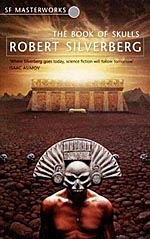
![]() Sable Aradia
Sable Aradia
10/2/2017
![]()
Read for the Science Fiction Masterworks Challenge, the Second Best Challenge, and the LGBTQ Speculative Fiction Challenge. This novel was nominated for the Hugo, Nebula, and Locus in 72-73, but won none of them.
This book gave me a bit of a roller-coaster ride. I was excited about it to start with. The premise is awesome; four young men, college kids in the late 60s, go out to a desert cult in the wilds of Arizona. Their mission? To achieve immortality. To accomplish this, two must die and two will be rewarded with eternity. One must willingly sacrifice himself for the others; one must be sacrificed by the others. Dark stuff!
It would have been nice if I could have really liked any of the four main characters though (and that's another thing; Silverberg treats all four as protagonists in their own story, cycling back and forth between each first person narrative.) All four of them are stereotypes of the college douchebag variety.
One of the major characters, Ned, is gay, or bisexual with a preference for men, and that's significant to character relationship, character and plot, so it definitely counts for the LGBTQ challenge. But I have to admit, it was a little jarring to be looking at the gay experience through the eyes of the early 70s, because so much that was being said and assumed would be considered horribly inappropriate and homophobic now. Ned thought of himself as a degenerate and a pervert, although I assume Silverberg must at least have had a close gay friend, because he does seem to know far more about the psychology of it than most 1970s writers (namely, that you're born gay or not, it's not a choice and it's not a result of deficiencies in your character or upbringing.)
It was also horribly jarring how blatantly racist and sexist the characters were! Really, if you think that the 70s were a time of women power and liberation, you need to read or watch some 1970s sci-fi. Women are objects that exist merely as they relate to men. The characters thought nothing of deliberately finding some girls to hook up with so that they would put them up for the night (though I suppose part of that is the sexual casuality of the 70s) and then leaving them in the morning without a word, and they casually rated each others' conquests.
Also, in the process of heading to the girls' place, a carload of Puerto Ricans gets into an accident in front of them. People are missing limbs and heads are cracked open while people are screaming. They just leave! Apparently because one of the girls is carrying hash on her and they don't want to be hassled by the cops. Never mind that people are dying. They don't even call an ambulance. Now, I understand the police were insane about even hash in the 70s, but I sincerely doubt they would have been searched while the police were trying to help a bunch of seriously injured and maybe dying people!
After that, even the ones who were growing on me the most - Ned, and Eli, the Jewish intellectual, who at least had a pang of conscience at this, but didn't let it stop him - could die in horrible pain as far as I was concerned.
But I persisted, because now I was about a third of the way through the book. From then until the halfway mark was an extended character study of the four over the course of the journey. I won't say they redeemed themselves to me in a GRRM kind of way, but you got to see a bit more about why they were all the douchebags that they were.
When they arrived at the monastery, things got interesting, and there's a lot of good psychological stuff in there, and also a wonderful extended procedural for doing Shadow Work in most mystical traditions, one I might recommend future students to. There I re-developed some of the empathy for the characters that I had lost.
This led up to a fascinating but inevitable climax, like watching a car slide into the other lane of a highway in slow motion. I won't reveal it to you, but I will say it was satisfying.
What stays with me most about the book, however, is that I'm not sure it's science fiction. I'm not sure it's fantasy either. Probably horror is its best category. Because just like in watching Pan's Labyrinth, you cannot be sure that anything supernatural or preternatural happens at all. There is no way to tell if the characters who survive actually achieve the immortality they've worked so hard to achieve! And it's a rather Pyrrhic victory.
Quite the ride! Very well written. Despite its glaring flaws, I would recommend it.
http://dianemorrison.wordpress.com